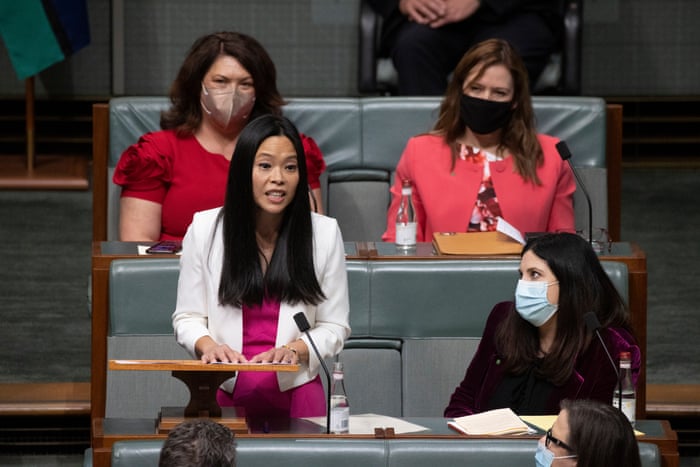
What we learned – Tuesday 26 July
That’s it for the blog today, thanks for reading.
Here are the main stories from today:
We will see you all here again tomorrow for another news-filled day!
Key events

Paul Karp
Zaneta Mascarenhas says her story would not be possible without Labor, in maiden speech
The Labor MP for Swan, Zaneta Mascarenhas, has given her first speech on the first day of parliament, which is also her 42nd birthday. Mascarenhas spoke about the legacy of the White Australia Policy and the need for more climate action.
Building cubby houses in the bush and chasing lizards in the red dirt – that’s how I grew up. I was born in Kalgoorlie and grew up in Kambalda, a nickel mining town in WA. My dad was a metal worker and my mum a lollypop lady and kindergarten cleaner.
She noted her “Australian story would not be possible” if not for a Labor government:
When my parents went to the embassy in Kenya they said to my dad – you have the right skills but you’re the wrong colour. This is because the White Australia policy was still in place. My parents came to Australia after Gough Whitlam dismantled the last parts of the White Australia policy. This story taught me two things – politics is personal … and that politics can transform lives.
Mascarenhas spoke about her career as an engineer (in “steel-capped boots on a mine site”) and her work on climate change, helping ASX200 companies decarbonise.
While I am proud of what some parts of the resource sector has done, I must stress that this is not uniform. Smart companies are looking at their climate risks and opportunities over the next three decades. This includes looking at value chains and scope 3 emissions. For us to achieve our goal of well below two degrees of warming, we need all sectors of the economy to pull their weight.
Mascarenhas noted the increasing frequency and intensity of disasters, which she labels “unnatural disasters” because they are partly caused by human-induced climate change.
It’s clear that we’re at a stage where both climate adaptation and mitigation are required. But the less we mitigate, the more costly it will be for us to adapt. I know that Australian people in disasters step up, support each other and show resilience – but just like an elastic band, there is a breaking point. We need proactive action.
Ferguson: “Tomorrow, we have new inflation figures out. They’re expected to be bad. Are you worried that you’re going to have to spend your first-term digging Australia out of this quagmire?”
Albanese:
Well, we’ll be giving an economic statement on Thursday through the Treasurer. We face economic headwinds. We face rising inflation. We face rising interest rates. There are real challenges there, but I’m comfortable that my government has a plan to deal with those challenges.
Ferguson: “Is that going to end up being your priority keeping the economy out of recession?”
It is a priority. For a Labor government, it is an economy in terms of the impact that it has on living standards and one of the things that we know is that working people in particular are under real … pressures. We said that during the election campaign. Working people know that. They’re going to the supermarket and they get hit with a bill that’s higher than what they got hit with a year ago.
Ferguson asks:
Do you have a responsibility to the Australian people to lay out the risks that this could end in war?
Albanese says:
We have a responsibility to put out the facts without raising fear that mightn’t eventuate. We need to have a sober response to the circumstances that we face. That’s what my government is committed to doing.
PM says he is ‘very vigilant’ about Chinese military buildup
Anthony Albanese has been on the ABC’s 7:30 report, where Sarah Ferguson asked him if China’s military buildup kept him awake at night – after deputy prime minister, Richard Marles, said it did.
The PM said:
Well, people will use their own definition. It certainly is one of concern and something that we’re very vigilant about. We’ve had regular national security committee meetings. I attended the Nato summit in Madrid. I attended the Quad leaders meeting because of the priority that’s on the changed security environment, not just in our region, but in the world.
Independent MP Zoe Daniel calls for climate action in first speech
The independent MP for Goldstein, Zoe Daniel, has used her first speech to call for “climate action … greater integrity, safety and empowerment for women and girls”.
Daniel, who defeated the Coalition’s assistant climate change minister Tim Wilson at the 2021 election, said her job will be to “hold the government to account for dramatically improved climate policy and targets, backed by the best science we have”.
The government’s carbon emission target – 43% by 2030 – must be enshrined in law as a floor, not a ceiling. We must have clear mechanisms to keep all of us – each of us – accountable to achieving net zero by 2050, if not before. 2040 is not a moment too soon.
Daniel spoke about her personal experience of “climate-related disasters” including “the scenes in Tacloban [in the Philippines], flattened by a storm surge that destroyed 90% of the city … bodies in the streets, cars in trees, giant boats atop buildings … and, amid the rubble, the shattered lives of residents”, which she described as “a turning point for me, a realisation of the impact climate change and its increasingly unmanageable weather events would have on communities”.
I have waded through floods in Northern New South Wales, Thailand and elsewhere in south-east Asia … seen the melting permafrost in the Arctic and the animals and people scrabbling for survival as the environment morphs under their feet..reported on the aftermath of cyclones in the Pacific, hurricanes in the US, bushfires in Australia and California …
In late 2019 I met former Australian fire chief Greg Mullins on the fireground amid bushfires in California. He and others had spent months making calls and writing letters trying to get a meeting with the former government to warn them to prepare for a Black Summer ahead. They were ignored. And during that summer of 2019-2020 like all Australians, I watched as those predicted fires came … changing communities forever, killing and displacing billions of animals, and burning through our precious landscape.
Daniel also warned about the “fragmentation of truth and trust and the danger that poses to our democracy – and the future of our communities and our children”. She said:
Authoritarianism, populism, disinformation and vast conspiracy theories have flourished in recent years in a volatile world. Social media has been used by Donald Trump, and others like him, to sow doubt on the integrity of elections.
Daniel said it was the parliament’s responsibility to “rebuild trust” but also warned her former colleagues in the press to “reflect on their own behaviour”.
Daniel did some brand differentiation from the teal independents, choosing to wear purple and white – the colours of suffragists like Vida Goldstein, after whom Goldstein is named.
Vida Goldstein also rejected party politics.
‘I ask you to vote for me because I am not a member of a political party,’ Vida told voters early last century. ‘Study has convinced me that party government is a system hat is entirely out of date … It is a cumbersome, unbusinesslike method of running the country.’

Paul Karp
Liberal MP Aaron Violi gives first speech
Liberal MP for Casey, Aaron Violi, is the first member of the opposition to give his first speech. Violi spoke about the fundamental importance of education, called for a no-holds-barred review of tax, and spoke about his near-miss in the Black Saturday bushfires of 2009.
On education, Violi said Australia needs:
A system focused on delivering tangible education outcomes for students to set them up for long-term success and provides parents with choice in their children’s education.
Governments over the last 20 years have invested billions in education, while results have been going backwards. This is unacceptable not only on the societal level but most importantly at the individual level. A robust education system focused on educational outcomes and opportunities is the foundation of our society and the individual. It needs to be the priority of government policy on education.
Violi said to sustainably deliver government programs we need “to acknowledge that the economy faces significant structural fiscal challenges that we as leaders cannot pass on to future generations”.
Violi said:
We need to undertake genuine, comprehensive and systemic reviews of both our tax system and our federation. These reviews need to ensure that we are driving efficiency in our spending and government responsibilities, while minimising the tax burden on Australians. These reviews cannot rule anything out before they start. They will need to form the basis of a national conversation on our direction as a country and how we will tackle the challenges we face.
On Black Saturday, Violi said:
There are moments in your life that define the person you become; for me that moment was February 7th 2009, Black Saturday. It was the moment I went from a carefree young man, living like I would live forever, to understanding that the most precious gifts we have are life and time. The difference between [my wife] Rachel and I being here today and being victims 174 and 175 was a matter of seconds and metres.
Violi didn’t elaborate on the incident, but later said that a “working phone line can be the difference between life and death”.

Joe Hinchliffe
Queensland premier reveals Bluey animators’ Olympics mascot offer
Queensland’s premier, Annastacia Palaszczuk, revealed the animators had offered their services in her opening remarks at Tuesday’s state budget estimates.

Benita Kolovos
In a September 2020 interview, Moira Deeming describes those behind Victoria’s Safe Schools program – introduced in 2010 to provide training for teachers to support LGBTQ+ students – as “pedophilia apologists” and said she “would rather lose [her] job than teach” the resources.
The excellent Cait Kelly is going to take you through for the last bit of the night, go well all!
First speeches start in the 47th parliament

Paul Karp
The Labor MP for Reid, Sally Sitou, is giving her first speech, about the need for a more representative parliament and for more “audacious dreamers” on climate change.
Sitou introduced herself as “the daughter of migrants, a proud Chinese-Lao-Australian” who grew up in Cabramatta in southwest Sydney and is “the product of good public education”.
Sitou said the White Australia Policy and the alienation of First Nations people from their identity were “decisions based on fear and a failure of imagination”, but in the past 50 years Australia has become a majority migrant nation.
She said:
As I look around our House of Representatives today, it feels like finally it is starting to live up to its name. A house made up of people who truly represent and reflect their communities. I believe it was important I put my hand up to stand for Reid, a thriving multicultural and multi-faith community. Because as audacious as this dream was – to run for our federal parliament – it has never been more important for someone like me to dream it. I grew up watching Home and Away and Neighbours. But I also grew up with a slight unease, not sure if I’d gone to the right schools, acutely aware of the postcode I grew up in, not sure of my place in this country. That’s why I think it’s important to have someone like me in our parliament, not for diversity sake. But because representatives that embody all of the Australian story make our parliament better and our democracy stronger …
This is a message I want to share with all young Australians. You are not defined by your postcode, the school you went to, or where your parents came from. In this country, you are defined by the content of your character and what you want to do for others – where the potential and promise of our nation is only limited by our imagination.
Sitou argued that at the 2021 election Australia again chose “care for country and future generations over fear” – this time in the context of climate change.
In the six years my son has been alive, he has already experienced the consequences of climate change. Events described as once-in-a-generation, experienced in just a few short years. He has now lived through the 2019 – 2020 NSW bushfire season – a “once in a generation event”. This year, he lived through a “once in a generation” rain and flooding event. And now heatwaves, breaking records across Europe – all “once in a generation events”. Surely we can no longer look at the situation before us and believe this is okay. Surely we can not say to my son and his generation that what we are doing to address climate change is enough. Surely it is time to be audacious dreamers and imagine a better way.


Natasha May
Airport baggage handlers threaten to strike
Australians flying internationally from east coast airports could see more delays as baggage handlers are threatening to go on strike due to proposed pay cuts and concerns about conditions.
Ground crew from the Emirates-owned group Dnata (the Dubai National Air Travel Agency) are taking their first step towards industrial action on Tuesday, applying to the Fair Work Commission to hold a vote on strike action.
The airport services provider supplies handling for up to 20 airlines including Qantas, Emirates, Etihad and Singapore Airlines. The federal court previously found Qantas’s outsourcing of 1,700 ground handler jobs in 2020 was unlawful. Qantas is currently seeking to appeal the ruling in the high court.
The full story is here:
Anthony Albanese moves to acknowledge Shinzo Abe in parliament
The prime minister, Anthony Albanese, has moved that the House of Representatives place on record its regret over the death of Shinzo Abe, and acknowledge the significant contribution the former prime minister of Japan made to regional and global affairs and to the Australia-Japan partnership. He moved that the house should “tender its profound sympathy to his family in their bereavement”.
Tory Shepherd
‘Thirsty’ crops bounce back but environment still missing out on water
About 800% more water was used to irrigate rice last year than the year before, and about 250% more was used for cotton, a report by the Australian Bureau of Statistics has shown.
The increase in crop irrigation came after higher rainfall in 2020-2021 drew an end to three “exceptionally warm and dry years”, the ABS reported on Tuesday.
From the drier environment of 2019-20, water for cotton went from about 380,000 megalitres up to more than 1.3m megalitres last financial year. Rice went from 61,000 megalitres to more than 538,000.
That short-term gain in water for irrigation comes as the federal government prepares to hand down the latest audit of environmental water for the Murray Darling Basin, which is expected to show that only a fraction of the promised 450 gigalitres is likely to be delivered.
While the wet conditions of La Niña saw an increase in water storage last year, “in many parts of the country, groundwater levels remained below average”, according to the ABS.
A separate ABS report yesterday showed that as well as a “dramatic increase” in crops such as cotton and rice, there was also increased production in grapes (28%), mandarins (40%) and almonds (17%). These and other crops are at record levels, the ABS said, with nut crops flourishing thanks to “orchard expansions and extensive new plantings in recent years”.
Cotton and rice are often criticised for being “thirsty” crops, sucking up valuable water resources. As annual crops, their size can be controlled and increased or decreased each year depending on water availability.
That’s not true for crops such as almonds, which were singled out in last week’s shocking State of the Environment report. There has been a more than 900% increase in almond production in the Murray Darling Basin, that report found.
That growth has happened “despite their substantial water requirements in a geographical area with severe and catastrophic water security issues”. The almond industry says it is a high value, sustainable industry that uses only water already allocated for agriculture.
The Australia Institute’s water expert, Kate McBride, said the water use statistics show that the irrigation industry bounced back, and that it did so faster than the environment following dry conditions. She said:
That is, in part, because, in certain areas such as the Darling Baaka river system, mass extraction is allowed to occur before significant flows are delivered downstream.
McBride said the long-term health of river systems needed to be taken into account after major rain events, especially considering climate change will lead to more variable conditions and extended dry periods.
The federal government is set to table the much-delayed Water for the Environment Special Account report in this sitting period. It will give the latest update on the promised delivery of 450 gigalitres by the 2024 deadline.


